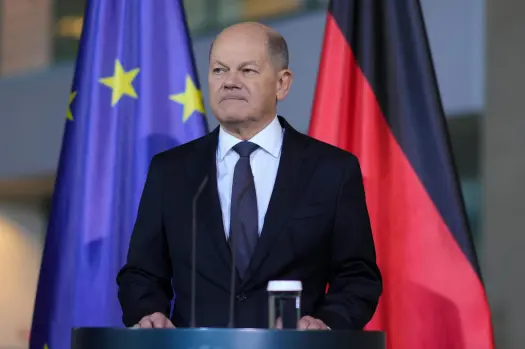I t may appear strange in most democracies, including India, that losing a no-confidence vote against a government leading to its fall is a cause for celebration for the ruling party. But, this is a normal phenomenon in German politics where defeat in a no-trust vote is lapped up by the ruling party as an opportunity to try its luck again to form a government with renewed energy in fresh elections which are an automatic fallout of the parliamentary exercise.
German Chancellor Olaf Scholz has just lost a vote of confidence in the German parliament. It is the outcome he seems to have hoped for when he called for the confidence vote last week. His aim, experts say, was to lose this vote now, win fresh elections and come back stronger next time. To give an idea of what his intention was he told members of parliament, the Bundestag, ahead of the 16 December vote, that “Politics is not a game” and that politicians need to think of the welfare of the country far more than their party or individual interests. In the Bundestag, 394 members voted “no,” 207 voted “yes” and 116 abstained. Scholz needed 367 “no” votes to achieve his goal. His three-party coalition government had collapsed in early November following the sacking by the Chancellor of his finance minister, Christian Lindner, head of the Free Democratic Party (FDP), who did not allow the government to make fresh borrowings to shore up the country’s stagnant economy. The FDP is one of three parties in the governing coalition Scholz led since December 2021. That left the remaining two coalition partners without a majority in parliament. In Germany, a motion for a vote of confidence is a rarely used, double-edged weapon that Chancellors use to manage political crises. While a successful vote can strengthen and even help repair fractures within a coalition, a lost vote automatically triggers new elections that may, if the gamble pays off, help the Chancellor’s party win in parliamentary elections with larger share of seats guaranteeing the stability of the new government.
During the past 75 years since the new federal republic was formed in Germany in 1949 after the end of Nazi rule, four Chancellors have used a motion for a vote of confidence to try to secure their hold on leadership. The results have been mixed. The first chancellor to call for such a vote was Willy Brandt in 1972. His politics of reconciliation with socialist and communist countries in Eastern Europe caused a rift among his SPD-led coalition. As per his plan, Brandt lost the vote but scored a decisive win in the following snap elections and strengthened his mandate to govern. Ten years later, another SPD chancellor, Helmut Schmidt, also called for a vote of confidence. He won that vote, but he was ousted soon after. Now another SPD Chancellor Scholz is using the no-confidence vote to seek a fresh mandate from the people so as to allow the formation of a new government with an outright majority and thus in a better position to run the government without any pressure from any alliance partner. The move is questionable. Scholz’s chances of winning the snap election look slim, though not impossible, analysts say. The reason is there is no clear frontrunner to challenge Scholz in the election likely to be held in February 2025.
However, Christian Democratic Union (CDU) leader Friedrich Merz, a conservative former businessman, is currently topping most polls, which show the CDU may emerge a winner. No wonder, he had called the confidence vote shortly before it was held that it was “a day of relief.” What may turn out to be the biggest surprise is a victory for the right-wing party Alternative for Deutschland (AfD) if it can cash in on voters’ disillusionment with Germany’s current political dysfunction. If that happens, Europe’s already shrinking liberal space may shrink further to the detriment of the world at large.






































